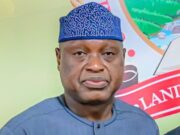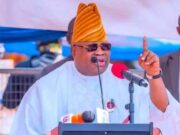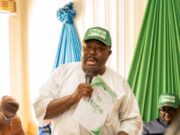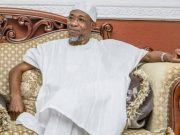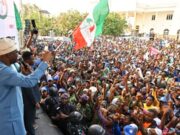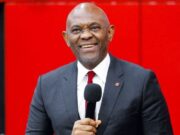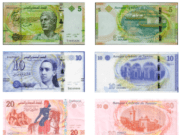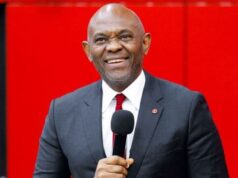The National Bureau of Statistics (NBS) has revealed that Nigeria’s Gross Domestic Product (GDP) recorded a growth of 2.51 per cent in real terms in the second quarter (Q2) of 2023.
In its Nigerian Gross Domestic Product (GDP) Report Q2 2023, released at the weekend, the NBS revealed that the growth contrasted with the 2.31 per cent increase reported in the first quarter (Q1) of this year.
However, it fell below the 3.54 per cent growth netted in the second quarter of 2022, when the GDP grew by 3.54 per cent.
The performance of the GDP in the second quarter of 2023 was driven mainly by the Services sector, which recorded a growth of 4.42 per cent and contributed 58.42 per cent to the aggregate GDP.
Also, the agriculture sector grew by 1.50 per cent, an improvement from the growth of 1.20 per cent recorded in the second quarter of 2022.
The report reads that: “in terms of share to the GDP, agriculture, and the industry sectors contributed less to the aggregate GDP in the second quarter of 2023 compared to the second quarter of 2022.”
NBS
The NBS stated that the growth of the industry sector was -1.94 per cent compared to -2.30 per cent recorded in the second quarter of 2022.
In nominal terms, the aggregate GDP stood at N52.10 trillion in Q2 this year (real GDP put at N17.72 trillion), surpassing the N45 trillion recorded in the corresponding period of the second quarter in 2022.
“In the quarter under review, aggregate GDP stood at N52,103,927.13 million in nominal terms. This performance is higher when compared to the second quarter of 2022 which recorded aggregate GDP of N45, 004,520.89 million, indicating a year-on-year nominal growth of 15.77%. For better clarity, the Nigerian economy has been classified broadly into the oil and non-oil sectors.”
Breaking down the GDP into oil and non-oil sectors, the NBS report further showed: “The real growth of the oil sector was –13.43% (year-on-year) in Q2 2023, indicating a decrease of 1.66% points relative to the rate recorded in the corresponding quarter of 2022 (-11.77%).
“Growth also decreased by 9.22% points when compared to Q1 2023 which was –4.21%. On a quarter-on-quarter basis, the oil sector recorded a growth rate of -14.12% in Q2 2023. The Oil sector contributed 5.34% to the total real GDP in Q2 2023, down from the figure recorded in the corresponding period of 2022 and down from the preceding quarter, where it contributed 6.33% and 6.21% respectively.
“The non-oil sector grew by 3.58% in real terms during the reference quarter (Q2 2023). This rate was lower by 1.19% points compared to the rate recorded in the same quarter of 2022 and 0.81% points higher than the first quarter of 2023.
“This sector was driven in the second quarter of 2023 mainly by Information and Communication (Telecommunication); Financial and Insurance (Financial Institutions); Trade; Agriculture (Crop production); Manufacturing (Food, Beverage & Tobacco); Construction; and Real Estate, accounting for positive GDP growth.
“In real terms, the non-oil sector contributed 94.66% to the nation’s GDP in the second quarter of 2023, higher than the share recorded in the second quarter of 2022 which was 93.67% and higher than the first quarter of 2023 recorded as 93.79%.”
This is just as the Federal Government has hinted of plans to rein in inflation, increase productivity and boost savings and investments.
Wale Edun’s Views
Minister of Finance and Coordinating Minister of the Economy, Mr Wale Edun said Nigerians should expect significant improvements in the overall economic performance.
Edun said ongoing government initiatives would put an end to hyperinflation and a decade-long decline in Gross Domestic Product (GDP) per capita.
He spoke at the retreat for the Presidential Committee on Fiscal Policy and Tax Reforms in Abuja.
According to him, the era of GDP per capita falling by 30 per cent over the past 10 years is over with the president’s ‘Renewed Hope Agenda’.
He also assured that the issue of “hyper-inflation in the nation’s economy would soon be a thing of the past.”
Nigeria’s inflation rate rose by 129 basis points from 22.79 per cent in June to 24.08 per cent in July, driven by the general increase in prices of basic living costs.
Edun noted that the government’s agenda would “create jobs, reduce poverty, control micro and macroeconomic policies, attract investors, stabilise the exchange rate and drive the economy to reduce poverty to the lowest level.”
He noted that although the removal of fuel subsidy has slowed down the economy, interventions have been put in place to cushion the pains of reform and correct subsidy leakages.
Edun reminded members of the Presidential Committee on Fiscal Policy and Tax Reforms of Tinubu’s 30-day deadline to deliver something tangible on their assignment, urging them to fast-track their assignment as there was no time to waste.
Credit: thenationonlineng.net



















